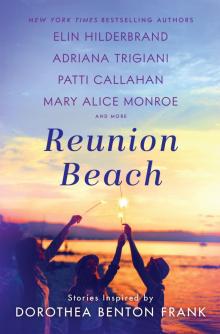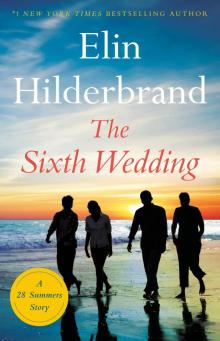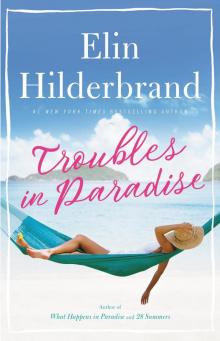- Home
- Elin Hilderbrand
The Sixth Wedding Page 2
The Sixth Wedding Read online
Page 2
Ursula smiles. She’s standing at the floor-to-ceiling windows in her living room that overlook Central Park. She feels like she could dip her toe in the Bethesda Fountain. She’s still in her running shorts and lululemon tank, both damp with sweat. She did four laps around the Reservoir as soon as the beastly heat of the day eased a bit. “I went for a run in the park,” Ursula says. “So I’m feeling very outdoorsy. And I’m going to order up from Marea after I talk to Dad. The lobster and burrata salad. I’ve been thinking about it all day.”
“You should start dating too, Mama,” Bess says. “I can make you a profile on Firepink? That’s the new one for olders.”
“Ha!” Ursula says. “Every man in this country already knows my profile. That’s what happens when you run for President. You lose your mystique on the dating apps.”
Bess laughs. “I love you, Mama.”
“I love you too, baby,” Ursula says. “Talk next week.”
They hang up and Ursula stays at the window, watching the sky turn purple, and tries to judge how Bess sounds. A bit too much like Ursula herself: lonely, and working too hard.
Ursula and Bess hadn’t always been this close; Bess’s adolescence had been a battlefield. Bess challenged Ursula’s political views and called her out on her relentless ambition. Achieving is the most important thing to you. It’s more important than love, Bess said when she was fifteen years old. And wow—Ursula had felt that comment like a slap to the face.
Bess has mellowed as she’s gotten older. She approved of Ursula’s vote against confirming Stone Cavendish as a Supreme Court Justice and when Ursula announced her bid for the presidency a short while later, Bess joined the campaign, courting Gen Z voters.
But the development that brought mother and daughter closer, the event that finally made them friends, was Ursula’s defeat on Election Day.
Ursula had been stunned when first Florida and then Ohio swung for her opponent, Fred Page. Ursula de Gournsey and Fred Page weren’t that dissimilar. Fred was a centrist who leaned a little left and Ursula a centrist who gravitated a bit right, but they agreed on more than they disagreed on and their debates had been civil, even collegial. Ursula felt she could afford to be nice to Fred (she hadn’t run a single attack ad) because she was dead certain that she was going to win. All of the polls had her ahead by three to five points. Her campaign had outspent Fred’s campaign by 20 percent. Bayer Burkhart, who served as Ursula’s shadow campaign manager, assured her daily that a de Gournsey presidency was a lock.
So what had happened?
All Ursula can come up with is that when people were alone in the voting booth, they couldn’t bring themselves to vote for a woman.
The problem wasn’t Ursula. It was American society.
Of course Ursula harbored plenty of private fears—that ultimately, she wasn’t likable; that the country saw her naked ambition, her quest for power; that somehow she hadn’t projected her desire to serve as effectively as Fred had. Ursula had focused too much on foreign policy, and not enough on controlling the pandemic. She had mentioned Notre Dame too many times, or Georgetown Law; she had seemed like a braggart when she told Anderson Cooper that she was fluent in French, Spanish, Italian. She rarely attended church, despite her Catholic background. She hadn’t seemed maternal enough, or like a devoted-enough wife. So much more was expected of a female candidate.
It didn’t matter. Fred Page had won fair and square. Ursula gave a beautiful concession speech wishing Fred the very best and encouraging her supporters to celebrate his victory.
She spent the next two days in their house in South Bend in a numb fog while Jake and Bess dealt with the news vans lined up on LaSalle Street. At night, Ursula would lie on the couch, clicking among the news outlets, listening to everyone’s surprised reactions about the outcome. Bess brought Ursula mugs of tea that she didn’t drink and made her sandwiches she didn’t eat. Bess covered Ursula with a blanket at night and kissed her mother’s temple.
“I’m proud of you,” Bess said. “You’re taking time to process. You aren’t making excuses. You aren’t blaming anyone. It takes an extraordinary person to handle this kind of loss as graciously as you are.”
At these words, Ursula sat up and stretched out her arms. Bess came to her and, finally, Ursula cried. She cried for her broken dreams, dreams she’d nurtured since she was a child, she cried out of embarrassment, she cried for her dead father; she had wanted to make him proud. She cried from exhaustion and bone-deep weariness. She had given the campaign everything she had—nearly two full years of her life, trips to forty-three states, bus rides, flights, hotel conference rooms. How many women, not to mention girls, had told her she was inspiring? How many virtual fundraisers had she attended where she had given some variation of her platform speech, “Straight Up the Fairway”? She spoke out for common sense politics, against extremist agendas. Ursula would be a moderate, clear-eyed president who would use her intellect and her excellent judgment to govern.
She cried because she had been rejected, plain and simple.
“It hurts,” she told Bess. “It really hurts.”
“I know, Mama, but that’s okay,” Bess said. “Pain means you’re growing.”
The call came three weeks later while Ursula was still convalescing, still dismantling her campaign, and still working as a United States senator from Indiana.
It was Fred Page. He asked Ursula to serve in his Cabinet. Attorney general.
This was, needless to say, unexpected. Indeed, unprecedented. And it wasn’t just a good-guy Fred Page promotional stunt. It wasn’t a “nod to unity.” Fred said, “You’re the most accomplished lawyer I know. I would trust you with the job above and beyond any other candidate on my list.”
Yes, Ursula thought. He’s right. I would be the best at this job.
Ursula told Fred she’d consider it, and she called her executive coach, Jeannie. After an hours-long conversation, Ursula and Jeannie reached some conclusions. Ursula didn’t want to be attorney general. She didn’t want to stay in politics at all; when her senatorial term was up, she would return to private life. She wanted to go back into mergers and acquisitions. She wanted to live in New York City.
She would do both, she decided.
After she hung up with Jeannie, she went to the kitchen where she found Jake walking in with a pizza from Barnaby’s.
“We have to talk,” she said.
Jeannie and I decided…
…you and Jeannie decided? You didn’t bother to ask me what I thought? Because I don’t matter, because you have no consideration for me or for this so-called family. Bess and I have always bent to your will and now your will is to be an attorney in New York and you think I’m just going to…what? Pick up and move my life there? I’m not, Ursula. I’m staying here.
Ursula had laughed. I’m not staying here one day longer than I have to. South Bend is the last place I want to end up.
Jake stared at her. I should have stood up to you long ago. Do you know why I didn’t? Because I have always believed that you were special. But I’m not giving in on this. If you go to New York, Ursula, you go alone.
It was an ultimatum, but was he serious? Was Ursula serious? They let the topic drop; Ursula still had a year of her term left so going anywhere was a moot point. Maybe Ursula was suffering from PTSD. Maybe she would change her mind and decide that it would be nice to stay in the Bend with her mother and Jake’s parents nearby. Or…maybe Ursula and Jake would finally get divorced. While they were dating, they had broken up a handful of times and seen other people but they had always gravitated back to each other. In the late nineties, Ursula had had an affair with her associate, Anders Jorgensen. Jake had conducted a one-weekend-a-year affair with a woman named Mallory Blessing for the entirety of their marriage. They had survived all that; surely, they would survive Ursula’s presidential loss.
Now, it’s four years later. Fred Page will sail easily into a second term and Ursula is the managing partner at Hamil
ton, Laverty & Smythe, the biggest M&A firm in the country. She bought a two-bedroom apartment on the seventy-eighth floor of 436 Park, which is the premier address in Midtown, maybe in all of New York. Ursula lost the presidency and lost her husband—but she’s gained a city. She loves the noise, the taxis, the subway, the sushi restaurants that deliver twenty-four hours, the elegant hotel bars, the doormen, the bodegas with their rainbow of floral bouquets out front. She loves the Cuban coffee place and the Vietnamese food truck. She loves racing down to Soho when she needs something new to wear, she loves the FDNY, she loves the guys who drive the horse carriages in Central Park, she loves the Upper East Side mommies and nannies, she loves the ten-story screens in Times Square and the tugboats on the East River. She loves that while everyone knows who she is, nobody cares, because this city is also home to Alicia Keys, Yoko Ono, Sarah Jessica Parker, people far more exciting than Ursula.
Does she wish she had someone to share it with?
Yes, she does.
Maybe a dating app, then, after all?
Ursula laughs at herself, and calls Jake.
She’s fully prepared to hear about his fun-filled weekend: sailing on Lake Michigan, meeting his parents for dinner at the South Haven Yacht Club, picking cherries, brunching in Saugatuck. At some point she’s sure Jake will start dating. Ursula will pretend to be supportive and he’ll know she’s pretending.
When he answers, he says, “You’re never going to believe who just called me.”
“Who.”
“Cooper Blessing,” Jake says. “He has the craziest idea.”
Cooper Blessing is hosting a bachelor weekend on Nantucket over Labor Day.
“Please tell me he’s not getting married again,” Ursula says. “What will that make it? Seven? Eight?”
“Six,” Jake says. “And no, he’s not getting married. It’s the opposite. He proposed to this girl named Stacey who was at Goucher when we were at Hopkins. She said no and now, as part of the work he’s doing with his new therapist, he wants to recreate the bachelor weekend—only make it all about the guys. Coop is single, Frazier Dooley is single…”
Yes, Ursula read about Frazier and Anna Dooley’s divorce in People. Anna walked with 280 million dollars—and Ursula had thought fleetingly, the way one does, about dating Frazier Dooley.
“And you’re single,” Ursula says.
“I shouldn’t say it’s ‘all about the guys,’ because Leland Gladstone is coming too,” Jake says. “She was with us the first year.”
“Wow,” Ursula says. “That’s going to be a veritable Who’s Who.” Leland Gladstone is the founder of the huge women’s lifestyle blog Leland’s Letter and was recently chosen as one of Time magazine’s Most Influential People of the Year.
Leland had been plenty influential in Ursula’s life. She wrote an article in Leland’s Letter entitled Same Time Next Year: Can It Save Modern Marriage?, which had been Ursula’s first hint about Jake and Mallory.
“Won’t it be difficult for you?” Ursula asks. “Going back to…”
“Mal’s cottage?” Jake says. He sighs. “I don’t know, Ursula. Probably. I’d rather not get into a big fight about it. I just got off the phone with Coop and I thought I’d let you know that I’ll be on Nantucket next weekend.”
“You’re letting me know now…but not the twenty-eight years that you went to see Mallory.”
“Ursula. We aren’t doing this.”
“Right,” Ursula says. “Well. Please give everyone my best…”
“Oh, I will.”
“And report back.”
“Of course, Sully.”
She smiles at the nickname. “Come see me sometime. I miss you.”
“That’s sweet of you to say. Talk next week.”
They hang up and Ursula presses her phone to her heart and stares out at the city beneath her; it’s dark enough now that lights are starting to come on.
Back to Nantucket for Labor Day. It sounds like fun, actually, and Ursula half-wishes she’d been invited. She pours herself a glass of wine, orders up her lobster and burrata from Marea, and downloads the Firepink app on her phone. She will create an online dating profile.
Ursula de Gournsey
Age: 56
This is going to hurt, Ursula thinks. But that’s okay. Pain means she’s growing.
Link
“So it’s okay with you if we invade the cottage?” Uncle Cooper asks.
“Yeah, of course,” Link says. When Uncle Coop said he was planning to head up to Nantucket for the weekend, Link was afraid he’d be expected to go along, and that was the last thing he wanted to do. He’d flown back to the island over the week of the Fourth of July, when he’d hung out with his friends from high school and even hooked up with his ex-girlfriend, Nicole, the one who ditched him on day six of her Italian semester abroad. While it had been fun, it also made Link unbearably sad. Link missed his mother every second of every day, but when he was on Nantucket, the memories were everywhere, especially in the cottage where Mallory had raised him for eighteen years. Mallory was present everywhere he looked—her books were on the shelves, her favorite green pans were in the kitchen cabinets; the quilt she made out of Link’s old T-shirts was smoothed across his bed. Link could see the spot on the front deck where Mallory used to sit when she watched Link and his friends swimming or when she drank her wine as the sun went down. Mallory and Link had their usual seats at the narrow harvest table—Link at the head, Mallory next to him in the seat closest to the kitchen, because she was often up to get extra napkins or more ice or second helpings for Link. They had their designated spots on the sofa—Link would do his homework, Mallory would grade papers. On Sunday, they watched football. His mother was a Baltimore Ravens fan, which he teased her about relentlessly.
Swim in a little, please! Link! Lincoln Dooley, swim in!
Did you brush your teeth?
Where are you with your history project?
Wanna kayak? We’ll be back in an hour, then I’ll drive you to Dylan’s.
Did you put on sunscreen?
Why the long face, handsome? Talk to Mama.
Call your father, please, he’s been texting me and I’m afraid he’s going to send drones next.
There’s a card from your grandparents on the counter. I bet it has money in it!
You know what makes everything better? Guacamole.
I will never be disappointed if you strike out swinging. That means you tried.
My eighth period class was a bitch today—come give your mom a hug.
You will never, ever understand how much I love you…until you have children of your own and then every word I’ve ever said will make perfect sense.
Link is relieved that the weekend Uncle Coop is planning is just for old people. Link’s father is flying in from Seattle, Leland is coming from New York, and…Jake McCloud is traveling to the island from South Bend, Indiana. It’s supposed to be a reunion of some weekend that happened before Link was born. Link doesn’t ask too many questions lest he get roped in.
Jake McCloud, though, has always intrigued him. When Mallory was dying, she asked Link to call Jake, and Jake and his daughter, Bess, had left the Ursula de Gournsey campaign so that Jake could come say goodbye to Mallory. He brought a guitar and sang to her.
Link and Bess McCloud had taken a walk on the beach and Link said, “I feel like something’s going on that I don’t understand.”
Bess said, “My dad told me Mallory is an old friend of his.”
“Oh,” Link said.
Bess had laughed. “Do they think we’re naïve? They’re more than friends.”
“Are they?” Link said. “I’ve never heard my mom mention his name before, and I would have remembered that. Your family is a very big deal.”
“My mother is a very big deal,” Bess said. “My dad and I are just…infantry soldiers.” She picked up a quahog shell. “Look!”
Link smiled. “You don’t get to the beach much?”
&n
bsp; Bess examined the inside of the shell, the swirls of blue and purple—wampum, what used to be traded like money. “I’m taking this home.” They kept walking. “I like thinking that my dad had something of his own, a secret friendship or whatever. Or maybe they’re in love. Maybe they’ve been in love all these years.”
“Maybe?” Link said. The thought was, frankly, absurd.
Link won’t lie: He’s psyched to have his uncle’s place in Georgetown to himself for the weekend. It’s a bachelor’s paradise. The townhouse on Q Street is three stories tall with a finished media room in the basement, and it’s decorated like something out of a design magazine. The whole house is done in black and white with pops of color—in the living room, there’s a curvy flame-orange sofa and two electric-lime-green cup chairs. There’s a sweeping staircase with a curved black banister. Coop has huge abstract paintings and modern sculpture on pedestals—it’s real art, he goes to the galleries and gets into complicated negotiations with the owners. And then there are antiques scattered throughout—some of the pieces are from Link’s grandparents’ house in Baltimore and some are from the far-flung countries Coop has visited. There’s a chess set from India that resides permanently in the sunny breakfast nook with windows that overlook the back courtyard, and every morning when there’s time, Coop and Link play. Link has gotten pretty good.
Link is thinking about having a party—just some of the other interns from Brookings and his fraternity brother, Woj, from USC, who’s working on Capitol Hill this summer and who knows a crazy amount of smart and beautiful women. It won’t be a full-blown banger—the last thing he wants is to trash Coop’s space—but he’s thinking about some good people and good whiskey (Coop has a wine and whiskey cellar tucked behind the home gym in the basement) out back in the courtyard. He’ll pick up some tacos and banh mi and play some music and generally flex like the place is his own.

 What Happens in Paradise
What Happens in Paradise Reunion Beach
Reunion Beach The Sixth Wedding
The Sixth Wedding 28 Summers
28 Summers Summer of '79: A Summer of '69 Story
Summer of '79: A Summer of '69 Story Troubles in Paradise
Troubles in Paradise The Perfect Couple
The Perfect Couple Winter Solstice
Winter Solstice Barefoot: A Novel
Barefoot: A Novel